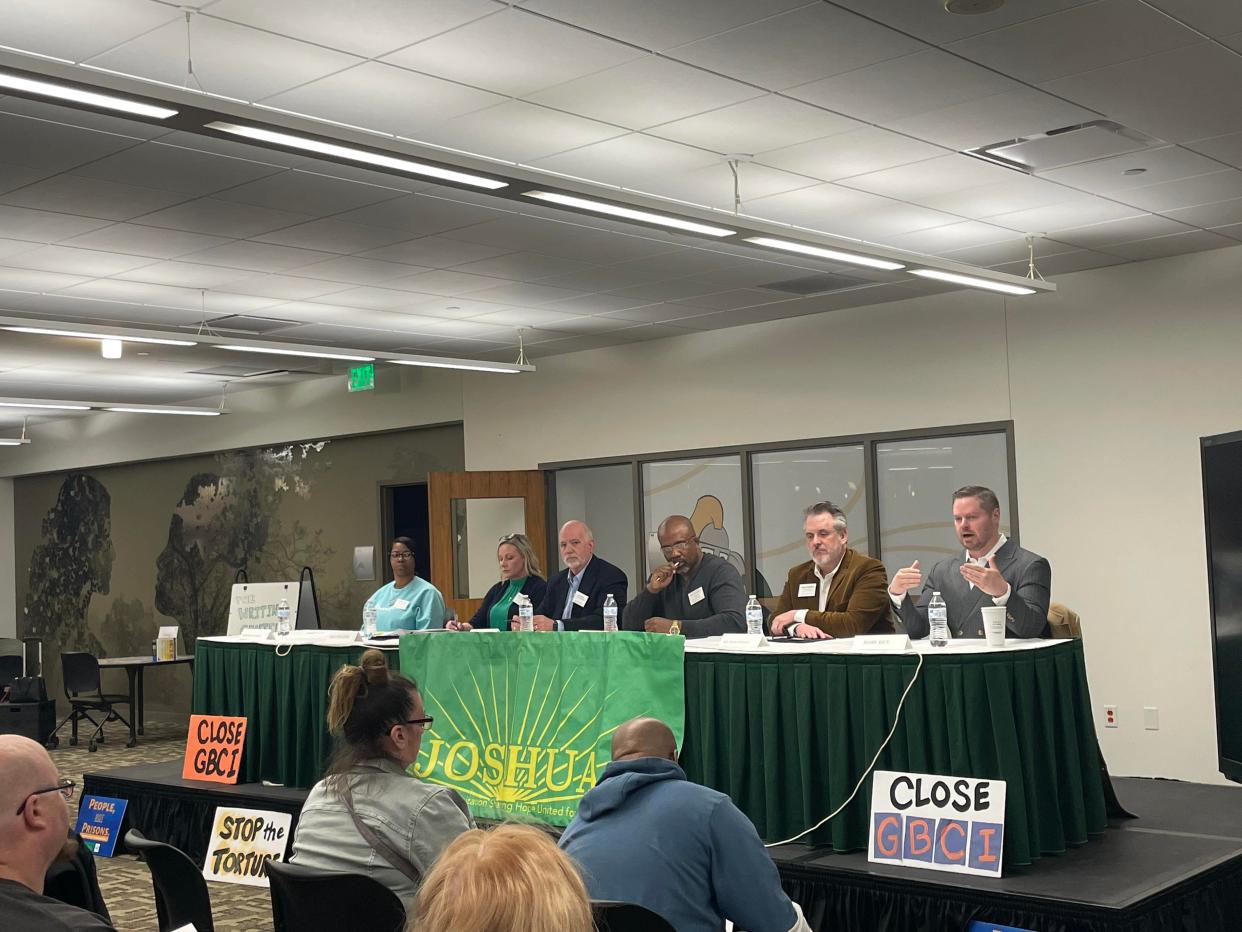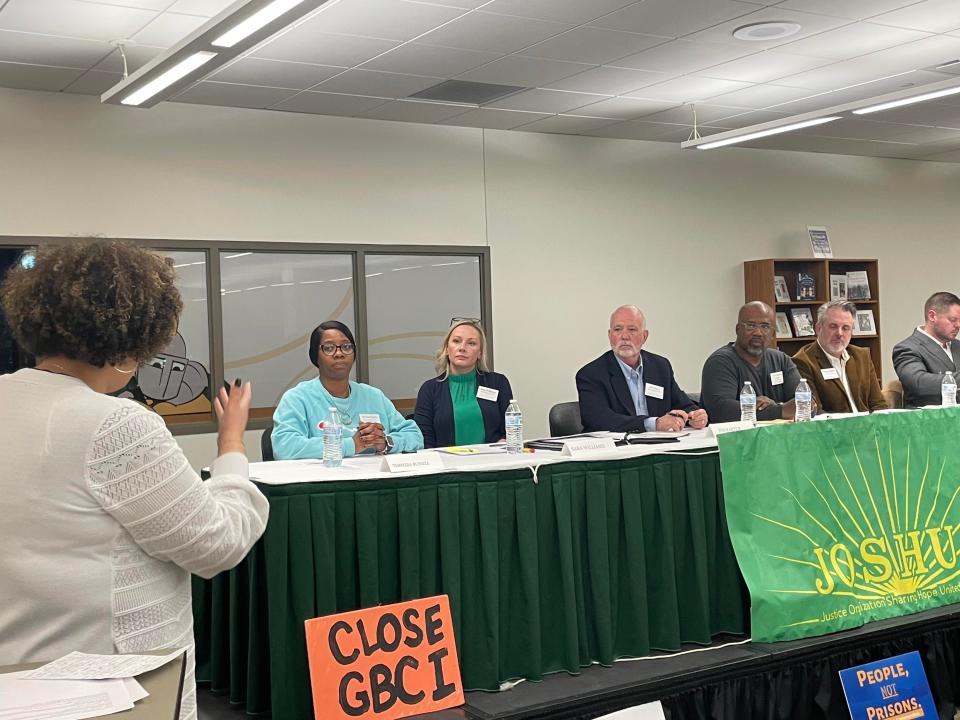'The people we love are hurting': Advocates at forum want Green Bay prison closed, justice reform

DE PERE – Terressa Russell doesn't know the half of what her son goes through as an inmate at Green Bay Correctional Institution, but what she does hear sounds like something out of a nightmare.
Russell's 24-year-old son isn't able to leave his cell more than three times a week, gets recreation time once a week and has no access to mental health services he needs. He receives no educational and vocational programming, eats every meal in his cell feet from his toilet, and has to alternate when he or his cellmate sleep because there's no room for both of them to lie down at the same time.
"They're being treated less than an animal, because you can't keep an animal closed up like that. It's against the law," Russell told USA TODAY NETWORK-Wisconsin. "But it's OK to do this to another human being? You're telling me human life is lesser than an animal's?
That question, and many like it, filled the room of the Mulva Library on Thursday night at St. Norbert College in De Pere, where members of WISDOM, a statewide network focused on transformational justice for the incarcerated, and JOSHUA, its Green Bay affiliate, held a community forum to discuss what's happening down the road at Green Bay Correctional Institutional.
It's been a year since Waupun Correctional Institution went on lockdown, or what the DOC refers to as a period of "modified movement." Green Bay Correctional Institution went on lockdown in June 2023. While Kevin Hoffman, the state Department of Corrections' deputy director of communications, has said that lockdowns were instituted in response to "multiple instances of assaultive behavior" by prisoners toward staff and other prisoners, parents like Russell have heard everything from it being due to COVID-19 to understaffing.
Many problems did unfold with COVID-19, as one incarcerated individual at GBCI noted in a letter read out loud at the event. Since 2020, the man wrote that weekly leisurely activity dropped from four hours to 15 minutes per week, mice of all shapes and sizes scurry in and out of the cells, and it's next to impossible to go to the library to read a book.
The combination of lockdowns, a crumbling institution, ongoing mice infestations, and growing anguish by parents and advocates over what they call torturous conditions at GBCI, brought community members to speak in De Pere. And the community had questions for the panelists about how we got here, what's being done and when the state will finally close the 19th-century prison in Allouez.
Panelists included Russell, JOSHUA and WISDOM leaders Sara Williams, Dant'e Cottingham, Mark Rice, state Rep. Dave Steffen, R-Howard, and Jim Rafter, Allouez village president. Ivy Summers, former JOSHUA member and associate library director of Mulva Library at St. Norbert College, moderated the two-hour event in De Pere.
"For far too long, Wisconsin has relied too much on prisons, courts and police responses to many of the problems in our state," Rice said. "Instead, we're calling on the state of Wisconsin to redirect resources to address the root causes of problems."

Lockdowns at GBCI are leading to increased violence, village president says
The size of a prison cell at GBCI is perhaps a bit wider than an adult man's wingspan. The cells were never designed to fit more than one adult at a time. But, with GBCI overcapacity by nearly 250 prisoners, the prisoners have doubled up.
Within that small space, two adult men must live a majority of their days. They eat three meals next to a toilet together, trade off who gets to lie down, and are only allowed out to wash themselves a few times a week, panelists throughout the night said.
It's only a matter of time, in such conditions, before it leads to violence, Rafter said.
The number of (GBCI) offenses investigated by the Brown County Sheriff's Office in 2023 was almost equal to that of 2021 and 2022 combined, Rafter told the audience.
"When you lock people up in a cell made for one, put two in there, and you're not letting them out, bad things happen," Rafter said.
Williams expressed concern as well for the prison staff, who also suffer from all the emotions that come with the frustrating combination of inmate overcapacity and understaffing.
"We're extremely concerned, too, about the officers, because we care about them as well. They have a job to do," Williams said. "How difficult must it be to work in those conditions?"
Mental health issues languish, with prisoners dying by suicide, attempting suicide, overdosing and self-harming
Steffen called GBCI a "dying decrepit facility" where nothing like mental health treatment can possibly exist. It was a point echoed by Rafter and Cottingham, the latter of whom spent over a decade as a prisoner there.
"Mental health doesn't exist when you're keeping people stuck in their cells," Rafter said.
"Whenever I do these panels, I always try to make sure I include the emotional part of that experience, how it felt walking into that building," Cottingham said. "One of the things you're trying to maintain is some degree of hope — and that building takes it away from you immediately."

Cottingham later read a letter from an incarcerated man who's served time at GBCI since 2018. The man had a history of post-traumatic stress disorder, treatment-resistant chronic depression and borderline personality disorder, as well as a tendency to self-harm.
The cells don't have call buttons that might alarm the guards they're in crisis, the letter read. But the button may not have mattered, because one day, after waiting hours for help, the guards ignored him when he said he was a danger to himself, the letter read.
The man slit his wrists and his throat with a razor. In his letter, he said he slit his wrists on two more occasions.
"There's no mental health help here. I have been waiting a month right now to be seen for my anxiety issues and a feeling of fear," the letter read.
Another letter writer from GBCI said he's struggled with mental health and addiction since he was a preteen: "I've begged for treatment. I have been mostly ignored. Sit and wait is the plan."
The sense of waiting has been a part of the lockdown experience, many letter writers said. Another letter writer said he's been languishing with a large cyst on his foot untreated for five months. The pain makes it difficult to walk or exercise. They also noted that it "seems there are more drugs in the prison than there are in the streets."
Mental health casts a long shadow for incarcerated people. Some people end up incarcerated because of a crisis; others get revoked during supervision because of a crisis.
Rice knows about this cycle well. While out on supervision, Rice struggled with a crisis that his probation officer wasn't trained to identify or handle. It landed him back in the system for another six months.
Members call on Evers to close the prison and work on reform
The panelists invoked Gov. Tony Evers to make good on his campaign promise of working with WISDOM and JOSHUA. Since his early campaign efforts, "he really has not followed through on that," Rice said.
And while panelists like Steffen were quick to talk about a new facility, it's not a facility advocates want to see replicated anywhere. Instead, they want to see Wisconsin's 2012 Treatment Alternatives and Diversions program fully funded, which could keep 3,000 Wisconsinites out of prison and more than 27,000 from ever going to jail.
Rice called on Evers to start commuting sentences, which is his power as governor. Wisconsin has nearly 3,000 prisoners who have long been eligible for parole but remain inside prison.
Steffen, who has been one of the biggest voices in the Wisconsin Legislature for closing GBCI, said that Evers continues to drag his feet on the matter despite growing bipartisan support.
"To be honest, we have a governor who's not ready to go there yet," Steffen said. "His planning probably puts it closing in 2032."
Williams said they'll continue to share stories of human beings stuck in facilities where no rehabilitation is possible. The stories are powerful and necessary, Williams said "to bring the humanness to this."
It's especially important that Wisconsin improves its correctional facilities because 95% of the incarcerated population will eventually be released, Williams said. They should be able to get jobs, find addiction and mental health treatment, and have the right to vote, she said.
Williams took a moment at the end to reflect on her own time in prison and the ways in which her parents struggled through that period in her life. She told Russell that her role, a mother of an incarcerated child, was that much more powerful for her.
"How brave it is that people like Terressa speak out," Williams said. "That's what's so important about this. The people we love are hurting."
Natalie Eilbert covers mental health issues for USA TODAY NETWORK-Wisconsin. She welcomes story tips and feedback. You can reach her at neilbert@gannett.com or view her Twitter profile at @natalie_eilbert. If you or someone you know is dealing with suicidal thoughts, call the National Suicide Prevention Lifeline at 988 or text "Hopeline" to the National Crisis Text Line at 741-741.
This article originally appeared on Green Bay Press-Gazette: Advocates dial up pressure with Evers to close Green Bay prison

